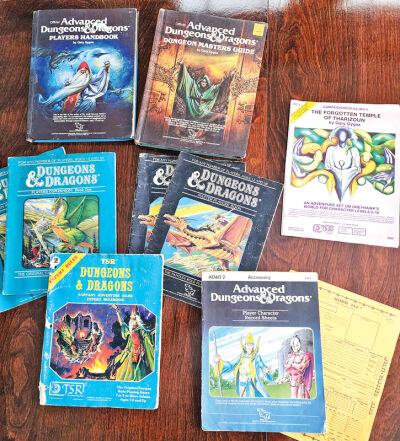
Earlier editions of Dungeons & Dragons manuals, including these from the 1980s, have been updated through the years. The game originated in 1974 and turned 50 in 2024.
Photo by Brian Louwers
METRO DETROIT — With its expansive history and dedicated fanbase, the tabletop role-playing game Dungeons & Dragons has attracted players young and old to take part in adventure and chaos.
David Cummings, a D&D player from Lake Orion, said the game has a long history.
“It originated as rules for playing individual characters on a skirmish game called Chainmail which was a miniatures game where you had units of soldiers fighting each other and they came up with rules that you could play individual soldiers on the field, and it grew from there,” Cummings said.
Over the years, the official Dungeons & Dragons “Player’s Handbook,” the “Dungeon Master’s Guide” and other guidebooks have gone through various changes. The most recent edition of the book was published in 2024, though many people still use rules from the fifth edition published in 2014.
Cummings said his group still uses rules from the fifth edition.
“We are kind of working some of the new rules into the game, but we used quite a few of the optional rules in the Dungeon Master’s Guide which have been dropped from the game in the new 2024 Dungeon Master’s Guide,” Cummings said.
Cummings started playing D&D when he was in college. The game includes a dungeon master who sets the stage for the story. The dungeon master, known as the DM, creates the story and the setting the players explore with their characters.
Cummings said he prefers being a DM more than being a player.
“I’m much more comfortable creating the larger picture and I like creating characters to the point where I like creating a lot of characters,” Cummings said. “And so as the dungeon master you get to create the bad guys and the NPCs (non-player characters) and the settings and stuff. There’s also a little bit more control.”
A character’s action effectiveness is determined by a series of dice the player uses. A set includes dice with four, six, eight, 10, 12 and 20 sides. The dice are used to determine player skills and attributes, assess damage, and establish percentages for success or failure of various actions, including thievery, attacks and spells.
“If you’re playing a certain type of character, you might get away with not needing one of those (dice) but it’s a heck of a lot easier to just buy a set that includes all of those,” Cummings said.
Cummings said due to the growing popularity of the game, the dice are now easier to get. Players can find sets at retailers such as Walmart and local gaming stores.
Character creation is half the fun of D&D. Some players and DMs call the character creation stage “session zero” of their campaign. Though character traits can be randomized, a lot of players think out their characters’ backgrounds and traits.
The character’s species and class help determine their statistics in areas such as strength, wisdom, intelligence, constitution and more. Examples of species include human, halfling, gnome, dragonborn and elf, while examples of character class include barbarian, bard, cleric and druid.
Cummings said he creates characters with drawings.
“I like to know what the character looks like and then that will kind of help me create the character,” Cummings said.
Stephen Ketcham, a D&D player from West Bloomfield, said his favorite part of the game is the collective storytelling nature.
“There’s usually a story framework, but everyone’s part of that and it’s evolving, and so we give and take and the back and forth and just that sort of that group storytelling aspect,” Ketcham said.
Ketcham started playing the game in the 1980s. At that point, the edition known as the “blue box” edition was the most current.
“So the books came in this blue box with a dragon on the front and everything,” Ketcham said.
He played the game through his childhood and stopped in college. He said he picked it back up around 10 years ago. Ketcham likes the fifth edition of the handbook.
He said he got back into D&D gaming again because a man came into the branch of the library he managed in West Bloomfield. Ketcham said the man was looking for players and wanted to place something on the bulletin board.
“So that’s how I met a guy that lived really close to the branch that I managed,” Ketcham said. “He got me back into it and then we have a couple other guys around our ages. So we game every other Friday night with that group, and we’ve been doing that probably for seven, eight, nine years.”
Ketcham said he’d recommend people check out D&D if they’re curious about it.
“If anyone that likes the creative storytelling, the ‘Choose Your Own Adventure’ stuff, ‘Lord of the Rings,’ all that kind of (stuff), yeah, do give it a try,” Ketcham said.
Cummings’ advice to first-time players is to not memorize the rules and play it strictly by the book. He explained a lot of rules sometimes get ignored because no one knew they were there.
“You don’t need to memorize all of the rules, you don’t need to bicker at the table and have the game stop because everyone’s trying to figure out how exactly a particular rule works,” Cummings said. “What we try to do and a lot of groups try to do is just get through that game session smoothly. Keep the story going. Try not to ruffle any personal feathers, of course.”
He went on to say that people can look up the rules afterwards.
Ketcham recommends first-time players watch YouTube videos explaining the game and its basics.
“Dungeons & Dragons isn’t just an easy game to sit down and play,” Ketcham said. “There’s a lot to it, a lot of rules. If you look at the character sheet, it’s just full of stuff.”
He encourages the new players he meets to stick with it. He also said new players should find a group willing to take on a new player. New players can find groups online, in local game stores, at local libraries and many other places.
The Dungeon Master’s Handbook and the Player’s Handbook, as well as many other guides, can be found at local libraries and bookstores. Rules and other sources of information can also be found on the D&D website at dndbeyond.com.
 Publication select ▼
Publication select ▼

























